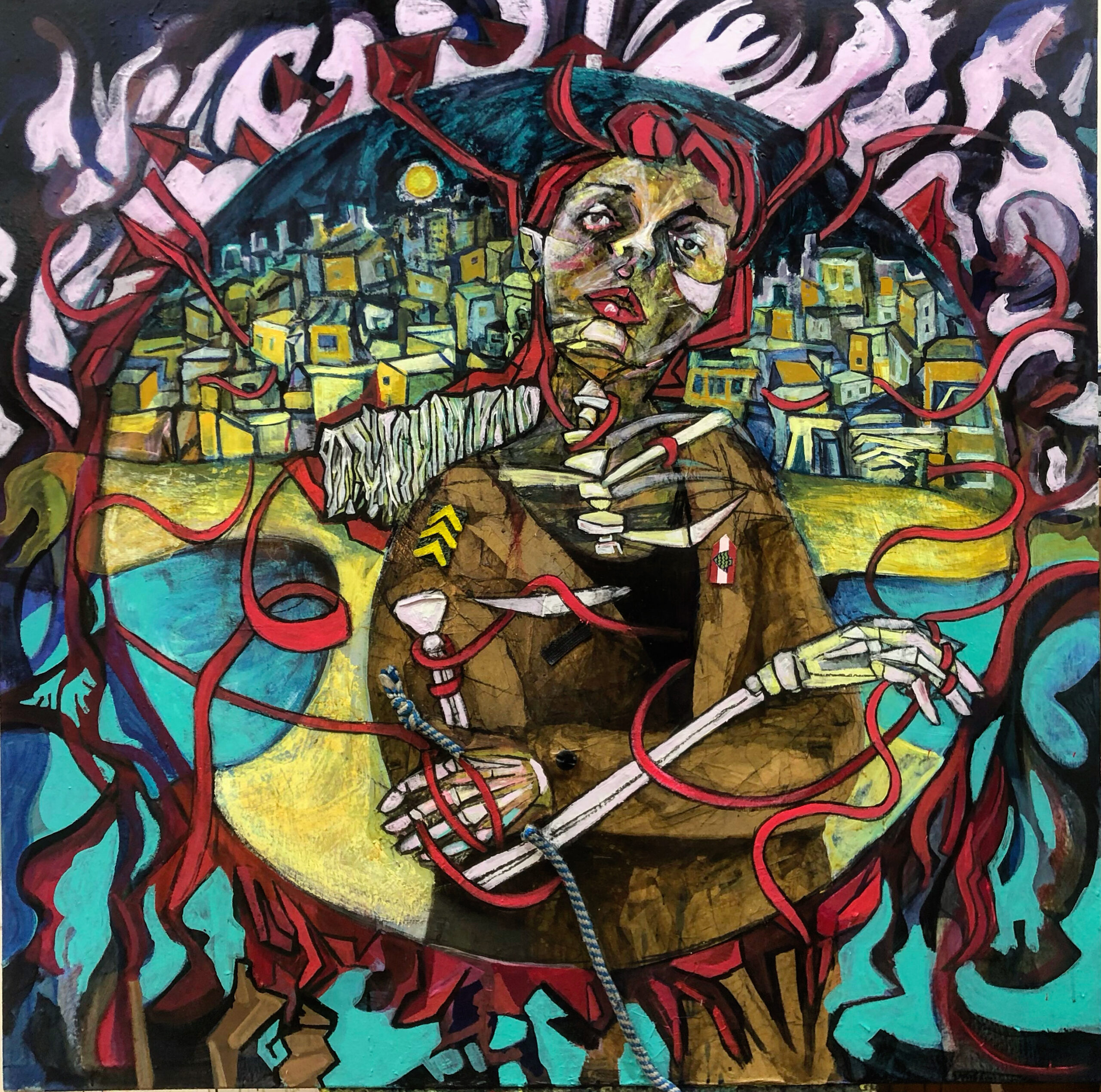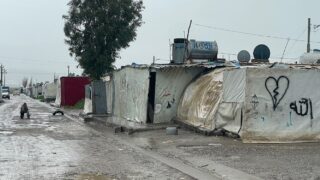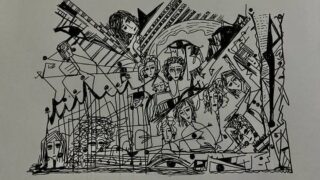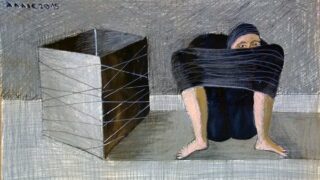
This publication has benefited from the support of the Rosa Luxemburg Foundation. This text may be reproduced in part or in full, provided the source is acknowledged.
“Which clan do you come from?” A simple boy startled me with his question, having exchanged a short conversation with him in the sit-in square in Baghdad, during the 2019 October Uprising. I immediately answered that I didn’t know, without stopping to take the question in. “I have no idea” – as if my answer were lurking, in my subconscious, rejecting even that idea of a family/clan to which the boy was referring. That was the end of our chat. When I told one of my relatives in Iraq about the boy’s story, I saw the same confusion creep up, followed by disapproval. He said that I should have answered with the name of a certain clan that, my relative says, my father’s family came from. This time, it was I who chose silence. I’m one of those who reject idea of belonging to a clan, especially when the question comes up while we’re gathered in a sit-in square, during an uprising, supposedly begun against all forms of authority that led the country to ruin, including clan authority.
To awaken sleeping authorities
In the 1990s, there was surprising interest in clans and their origins. Back then, trionyms and quatronyms would be noted in official papers, and commonly used in Iraq, and extended families were simply a mother’s and father’s relatives we personally knew. Citizenship laws and Iraqi Civil Law have for many decades approved trionyms as sufficient for official identification, and that a clan’s name was unnecessary. Notably, asking for a clan’s name was no ordinary thing among people, especially in cities.
Things changed, however, in the 1990s, particularly after the 1991 uprising in central and southern cities of Iraq (1). In its attempt to regain control over the situation, especially following rising popular discontent against its actions, and against the horrific crimes it committed against its protesters, the former regime launched a campaign in two dimensions. The first was to curry favour with clans, especially in governorates of unrest, and to turn a blind eye to their use of clan-based law rather than civil law. The second was to make room for religious discourse and religious leaders, including what was then termed the “faith campaign”, so that those could manage, with their thoughts and sermons, to numb popular discontent over the situation and the growing impoverishment they were living. The former president thus started calling himself “Saddam Hussein Al-Tikriti”, assuming a clan name for himself, running a far-reaching campaign to prove that his family were descendants of “Ahl al-Bayt”, Imam Ali Ben Abi Taleb’s clan, in specific. That was the beginning of free rein granted to the clansmen and religious leaders at the expense of civil life and laws, which had governed Iraq ever since the beginning of the republic, perhaps even ever since modern Iraq’s foundation. What was known as a “democracy of components” was thus “invented”, and power-sharing was endorsed in the constitution. It thus opened the door wide open to chaos, and led to the termination of all civil state institutions and law enforcement systems. People then appealed to their own judgement, and found protection in clans and religious leaders, in the absence of law and unchecked armament.
The economic siege
“During Saddam’s Qadisiyyah (the Iraq-Iran war) and the Mother of all Battles (the First Gulf War), our men were at the front and we protected our homes.” With this, a woman from the Ahwar of Iraq’s countryside (2) summarised the state of Iraqi women for decades, in a report that the official Iraqi channel made during the siege, where that woman appeared to be carrying, in her mashhouf (a slim canoe that enables movement between papyrus and reeds in the Ahwar), her little child, and a fish that she caught herself from the area.
One cannot discuss the situation of Iraqi women without referring to an important point in Iraq’s modern history, which we can actually determine as the beginning of the economic siege over Iraq in the 1990s. The siege not only destroyed the middle class, worsened the economic situation for the general Iraqi population, but also caused the collapse of education, healthcare, and overall social welfare.
During the siege, women raised their kids and found ways to sustain life. They learned to create alternatives for everything, for the main supplies that became scarce during the siege, or completely disappeared. In the meantime, “exchange economy” appeared and became organised; mainly women, in urban and rural neighbourhoods, would exchange possessions and services, offering what was available and accessible to each.
That was an extremely rough period -one of many in this disrupted country- but that held many hopes for women, thanks to the roles they played, proving marvellous ability to withstand and manoeuvre the catastrophic conditions around them. Such promise, hope, and proven skill was, in parallel, and to the same extent, terrifying to the powerful patriarchy, built on religion and clans. And Iraq is famous for extreme contradictions. The events that took place in Iraq, and which it lived over the past half century, resulted in disrupted relations of contradictions, however, in favour of the system. Although, perhaps, this is but a temporary disruption.
One cannot discuss the situation of Iraqi women without referring to an important point in Iraq’s modern history, which we can actually determine as the beginning of the economic siege over Iraq in the 1990s. The siege not only destroyed the middle class, worsened the economic situation for the general Iraqi population, but also caused the collapse of education, healthcare, and overall social welfare. As that woman from Ahwar put it, women filled in for the shortage of workers, sustained production, and became the biggest workforce in factories, farms, hospitals, and governmental departments – as the men were at the warfront, fighting a gory war with Iran, which lasted eight years. Right before then, Iraq had reached zero illiteracy and had built an advanced healthcare system. The percentage of working women was the highest in the region then (23 percent), but dropped drastically during the years of the siege, to reach no more than 10 percent of the labour market. Governmental programs that provided public transportation to work hubs were cancelled, as were childcare programs offered to working mothers, and others. Due to the deteriorated economic condition, many families preferred that their daughters quit their schools, or that they didn’t go to school in the first place. Literacy among women thus grew to a large extent, especially in rural areas. At the same time, many men were forced to leave the country, in search of work opportunities outside Iraq, leaving their women in rough siege conditions. The latter would raise their kids and find ways to sustain life: they’d bake bread at home, sew clothes, sell their own belongings and their home’s possessions to feed their kids, as they learned at home to create alternatives for everything – that is, for the main supplies that became scarce during the siege, or completely disappeared. In the meantime, “exchange economy” appeared and became organised; mainly women, in urban and rural neighbourhoods, would exchange possessions and services, offering what was available and accessible to each.
The Faith Campaign
The “Faith Campaign” was launched by former president Saddam Hussein in 1993, at an extremely rough economic moment, where people needed to cling onto any hope, and so found refuge in religion. Plenty of room was given for religious leaders to broadcast their thoughts through platforms and television screens, and hijab-wearing spread among women, not only for religious reasons, but also because they were no longer able to take care of how they looked.
In trying to regain control, Saddam Hussein’s regime launched a campaign -especially following the humiliating retreat of the Iraqi army from Kuwait- in two dimensions. The first was to curry favour with clans, especially in governorates of unrest, and to turn a blind eye to their use of clan-based law rather than civil law. The second was to make room for religious discourse and religious leaders, including what was then termed the “faith campaign”.
As talk increased about what women should or shouldn’t do in the eyes of sharia and religion, and as puritan notions invaded homes, poverty would drive many women and girls to work in prostitution or become victims of human trafficking networks, which started exporting girls, selling them in Iraq and abroad. At a time when official television channels broadcast speeches and religious shows, President Saddam Hussein’s son, Uday, known to be a women’s stalker and a sexual sadist, launched his own television channel, called the Youth Channel, through which he began funding artistic works (songs, series, theatres…). Those were mostly chosen in poor taste and low standards, and undervalued women and stereotyped them as tools for sex and pleasure only. Alternately, they would show women to be cunning, cheaters, and unreliable. That same Uday Saddam Hussein, though, was the one who led a campaign with the notorious “Saddam’s Fidayees” in 1998 to raid a few prostitution homes in Al-Batawine area in Baghdad, where sex workers were slaughtered with swords right in front of their homes, and in full daylight. It happened after the newspaper the Pulse of Youth, also owned by Uday, published a report inciting against sex-work homes. All this happened as country officials entertained their guests in their own private reunions and parties – bringing in dancers, who were usually minors, and forcing them to provide sexual services to both guests and officials.
To awaken tribalism
Tribalism never disappeared from Iraq, but it was certainly torn down and contained under the authority of civil law, especially following the foundation of the Iraqi republic and the ratification of the Personal Status Law in Iraq in 1959. As their effect completely faded in cities, clan councils in rural country existed only for counsel – they had no authority over no one where the law applied.
Things remained so until former president Saddam Hussein awakened that authority from their slumber, for his own utilitarian ends. Gradually, clan-based law would reimpose itself in the streets. Not a car accident, a personal dispute between two people, or such other normal mundane issues, would pass by without going through “clan courts” - where punishments and penalties would be determined by the clan sheikhs. And because this became a source of wealth for clan dignitaries, and especially “invented” ones, protected by authorities and granted heaps of arms, they clasped onto it, and started determining financial returns for each and every accident, regardless of the law’s say in it. As Iraqi state institutions became fragmented, destroyed, and broken – as a result of the consecutive depletion that the wars and siege instilled, latest of which was the American occupation of 2003, and a number of decisions it made towards disintegrating the state, approving a mechanism of power-sharing and its ensuing corruption – people were drawn back to their own tribal affiliations. Furthermore, they looked for a new sense of belonging of a strong clan or a “back”, as it goes, to lean on and protect them in their own affairs and help them access what they needed.
The Iraq-Iran war and then the first Gulf War was an extremely rough period -one of many in this disrupted country- but that also held many hopes for women. They played roles that proved marvellous ability to withstand and manoeuvre the catastrophic conditions around them. Such promise, hope, and proven skill was, in parallel, and to the same extent, terrifying to the powerful patriarchy, built on religion and clans. And Iraq is famous for extreme contradictions.
Those clans, then, filled the void that the collapsed state institutions left, especially following the US occupation of Iraq in 2003. Their power and grip would only amplify: they became the ones who called the shots, and were above the law. As such and ever since, Iraq would be ruled by a triptych of religion/sects, clans, and arms – a triptych that unequivocally declares itself as a male creation, and answers to males only.
Women and clan-based customs
“Women are valued among us. Our clans’ honour is generally defined in the name of a women. This shows how respected women are.” This was a religious leader’s comment on a television show that discussed women’s status in Iraq. His comment was in response a feminist Iraqi activist’s opening words on the show (3), who noted the rising cases of domestic violence and the authorities’ failure to address it. What the religious leader implied, however, could be one of the most important practices that convey much of Iraqi society’s contradictions. Men, especially in rural Iraq, swear by a sister’s name and take pride in them: “I’m the brother of so and so girl”, “I’m your brother, sister”. In the meantime, men curse, in both rural country and urban cities alike, each other also by using sisters’ names. They either mention her reproductive organ or stick one of those “shameful” traits to her name, despite having nothing to do whatsoever, the sister, that is, with her brother’s doings. It is also very possible that that very brother treats his sister badly and violently too, but still, it would be she who would always be cursed by association. Why sisters? Because the “honour” and “reputation” of the family’s and clan’s men is laden on sisters. In parallel, a sister also brings the men “shame” if she were to disobey their rules. The meaning of respect that the abovementioned sheikh perceives is that a sister carries her brother’s burden – or that women, in general, should be laden with the burden of their male relatives’ honour. That is why, in clan rules, a murderer’s clan can redeem the murderer’s life by gifting the clan of the murdered person one or a few of its girls; as such, bloods mix, so to speak, and the fighting between the two clans could come to an end. One of the fasliya (arbitration) traditions is for the girl(s) chosen as tribute(s) for such a wedding to enter her/their “husband’s” home in humiliation – with nothing but their clothes and no wedding celebrations whatsoever. They are often treated badly by the family of the murdered man, because they are somehow paying the price for a crime that a man/men from their own clan had committed. This frequently results in the girls’ suicide or escape. Although fasliya customs are criminalised by law, they happen still on a daily basis in Iraq, without accountability. The nahwa (forbidding) tradition is yet another such custom, whereby a male cousin “forbids” his female cousin from marrying anyone but him – as, according to tribal customs, a cousin has priority to marry his own, who may be forced to marry him against her own wishes.
Matters worsened with the deteriorated economic situation, followed by the US occupation of Iraq, which “invented” a “democracy of components” and ratified power-sharing in the constitution. It thus opened the door wide open to chaos and led to the termination of all civil state institutions and law enforcement systems. People then appealed to their own judgement, and found protection in clans and religious leaders, in the absence of law and unchecked armament.
As clans have become centres of authority, politicians cater to them to ensure electoral votes, and their interests entwine with religious leaders’ interests. They have therefore been rendered unbridled, and no limits exist to what they can do. They’re powerful, frightfully armed, and backed by religion. There is therefore no law or executive authority that could control them. As such, women find no one to resort to in case they are beaten or forced to marry against their will. There have been many cases in Iraq where women resorted to the police to protect them, who then returned them to their own families, which, in turn, killed them. This happens because the police and legal authorities themselves are scared of clan power, and say so very clearly.
A weakened rule of law and feminist resistance
Although the Personal Status Law that was ratified in 1959 wasn’t perfect, it was one of the most progressive in the region at the time – when it came to questions of marriage, divorce, child custody, heritage, and otherwise. Its ratification helped improve women’s situation in Iraq in general, and women became much more active society members. One of the cowriters of this law was Dr Naziha Al-Dulaimi, who was Minister of Municipalities at the time, and was the first woman in Iraq and the Arab world to hold a minister’s position.
People reverted back to their clan affiliations, to lean on and protect them in their own affairs and help them access what they needed. For Iraqi state institutions had become fragmented, destroyed, and broken – as a result of the consecutive depletion that the wars and siege instilled, latest of which was the American occupation of 2003, and a number of decisions it made towards disintegrating the state, approving a mechanism of power-sharing and its ensuing corruption.
As one tragic period followed another, and as one government and its inconsistent visions followed another, the legal situation of women in Iraq continued to regress, while a number of different amendments to the law only took away from women’s rights, rather than improved upon them. This continues today.
However, despite all the wars still waged against women from more than one direction in Iraq, Iraqi women resist these authorities all together, every day, and in many ways. Feminist organisations on Iraqi streets today are at work, despite all types of dangers and threats. They have managed to stop passing laws that would have made matters worse. For instance, parties wanted to legitimise all injustices committed against women, like the Jaafari Law, which sanctioned marrying minors aged 9 or older. Likewise, an attempt was made to amend article 57 of the Personal Status Law, to take away custody from mothers when children were seven years old or older. Those feminist organisations have also been leading a battle for years, against religious parties, to enact a law that criminalised and punished domestic violence. They have been also fighting to amend current articles in the law which wronged women, like article 41 of penal code no. 111 (1969), which sanctions a husband beating his wife to discipline her – “as long as he abides by what’s approved by the sharia, law, or customs”. Another article that feminists have been fighting is article 398 of the same law, which relieves rapists of their crime if they were to marry their own victim.
Similarly, article 409 reduces the sentence for men’s “honour” crimes. All these equally exist in different shapes and articles of laws valid in most Arab countries. In light of a weakened rule of law to protect women on the one hand and its bias towards men on the other, Iraqi women have been tipping the scales, using society’s fear of scandal in their own favour. Instead of filing complaints with authorities that cannot protect them, women today use social media pages to expose harassers in the street by filming them, and harassers online by publishing the conversations they send them. Likewise, they expose domestic violence against them by telling and documenting it. As such, they publicly display their issues and the injustices they face.
Iraqi women resist, every day, and in many ways. Feminist organisations on Iraqi streets today are at work, despite all types of dangers and threats, sometimes including murder. They still managed, however, to stop some laws from being passed, which would have made matters worse for women. Laws that powerful parties wanted to enact in an attempt to legalise all injustices committed against women.
This is what one Iraqi lady did, for instance, in October 2021, when she filmed herself asking authorities to intervene to save her girl from her father, a military man, who kidnapped 12 year old Israa following her mother’s divorce. He did so despite the court’s ruling in favour of the mother’s right to custody – getting the child married by a religious contract. A few days later, the civil police director issued a statement to the effect that the marriage had taken place with the child’s approval, even though marrying children under fifteen is considered a crime by effective Iraqi law. This was yet another proof that the civil police cannot apply the law, and even justifies its violation. Later, the mother announced that the father intended to certify the marriage contract at court; as such, a number of feminist activists protested before the court, and managed to stop the certification of the contract.
However, despite all that, Israa remained with her father, and never came back. The mother never stopped demanding her child back, regardless of attempts by the father to distort her reputation and spread lies about her. Finally, the case would only be resolved by an intervention from the prime minister himself, who sent a special force that arrested the father and returned the daughter back to her mother. The question asked then became why should the highest authority of the country, intervene, in person, to apply that which is legal and already clear? Does this fall under the authority of the prime minister, or should there be an executive authority to enforce the law? And would the prime minister have acted were it not for the noise that the mother’s pleas and videos created on Iraqi streets?
Israa’s case wasn’t the first that required noise for things to be shaken and move forward. There were many others, like the murder of a young woman named Nourzan, who, were it not for the street cameras that captured the crime against her, subsequently circulated on social media, the murderers wouldn’t have been caught. They were her relatives, who killed her for refusing to marry her cousin. In many domestic violence cases, civil police forces hasten to cover up the scandal. Iraqi women thus know that opening up the conversation to the public and trying to push society to attempt to justify its actions would lead to upending its excuses. When a video of a clan sheikh was circulated, announcing that he was giving his daughter as tribute to those who came to pay their respects and condolences to his clan, they appeared for the frail and scandalous excuses that they were – and society couldn’t accept them. Until the day legal rights replace the fear of scandal, Iraqis will have to continue to face the power of clans, religion, weapons, and the absent rule of law with speaking out and resisting with the tools available.
In light of a weakened rule of law to protect women, Iraqi women have been tipping the scales, using society’s fear of scandal in their own favour. Instead of filing complaints with authorities that cannot protect them, women today use social media pages to expose harassers in the street by filming them, and harassers online by publishing the conversations they send them. Likewise, they expose domestic violence against them by telling and documenting it. As such, they publicly display their issues and the injustices they face.
In the mid 1990s, a clan tree arrived into our house, sent our relatives to my father. My male siblings’ names, even their youngest, were beautifully scripted on the carefully ornamented tree leaves, while my sister’s and mother’s names and mine weren’t there. I asked my mother then about why my name and all our female family members weren’t there in the tree. She answered calmly, with a smile: “Maybe we needjj to create our own family tree, where we place female and male names together.”
The content of this publication is the sole responsibility of Assafir Al-Arabi and Rosa Luxemburg Foundation cannot accept any liability for it.
Translated from Arabic by Yasmine Haj
Published in Assafir Al-Arabi on 08/01/2022
1) The uprising broke out against the former Iraqi president, Saddam Hussein, following the humiliating defeat of the Iraqi army in Kuwait, and included 15 governorates of Iraq’s 18. They were met with violent and far-reaching oppression to regain control over the situation, which resulted in hundreds of thousands of victims and mass graves, with some yet to be discovered.
2) Marshlands in Southern Iraq, with an area that covers nearly 40 thousand km2. It stands out for the wealth and diversity of its plants, animals, birds, and fishes, and for the lifestyle unique to its population, who live in semi-floating reed homes called gabayesh. UNESCO listed the Ahwar of Iraq in 2016 as a World Heritage Site, as an international natural reserve, alongside the ancient archaeological cities found nearby, like Ur, Eridu, and Wuruk/Warka.
3) Jaafar Talk Show, Deutsche Welle Arabic, broadcast from Baghdad on November 16, 2021.







